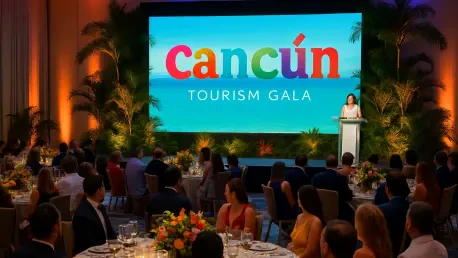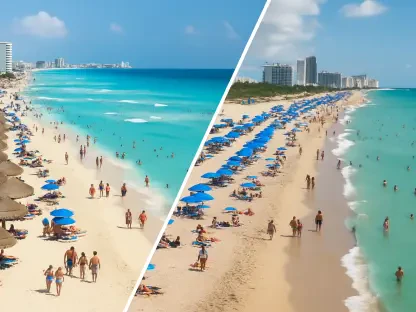Imagine a night where the heart of Latin American tourism beats strongest, set against the backdrop of turquoise waters and white-sand beaches in Cancún, Mexico, a city that embodies the region’s vibrant allure. On September 27, this dynamic destination welcomed the prestigious World Travel Awards (WTA) Latin America Gala, an event that celebrates the pinnacle of achievement in travel and hospitality. With industry leaders and innovators converging in one of the region’s most iconic destinations, this roundup gathers diverse opinions, tips, and insights from multiple sources to explore the significance of this gala. The purpose is to highlight varying perspectives on the event’s impact, Cancún’s role as host, and the broader implications for the Latin American tourism landscape.
Unpacking the Significance of the Gala
A Celebration of Regional Excellence
Insights from industry observers emphasize the gala’s role as a benchmark for excellence in Latin American tourism. Many note that the awards recognize standout performers across sectors like hospitality, airlines, and destination branding, setting a high standard for innovation. A common view is that such recognition inspires smaller players to elevate their offerings, pushing the boundaries of creativity in the region.
Another perspective focuses on the competitive edge these awards provide. Some stakeholders argue that winning a WTA title boosts global visibility, often translating into increased bookings and partnerships. This opinion underscores the event’s value beyond mere celebration, positioning it as a catalyst for economic growth in the tourism sector.
A contrasting viewpoint raises concerns about accessibility to such recognition. Certain sources suggest that emerging destinations struggle to gain nominations against well-established giants, prompting discussions on how criteria could evolve to ensure fairness. This debate highlights a need for inclusivity in celebrating the diverse tapestry of Latin American travel.
Cancún’s Spotlight Moment
Feedback from tourism boards and local businesses in Cancún reveals immense pride in hosting this landmark event. Many describe the city as a perfect blend of natural beauty and luxury infrastructure, with venues like AVA Resort Cancun showcasing world-class hospitality. This consensus paints Cancún as an ideal ambassador for the region’s tourism potential.
Differing opinions emerge on the tangible benefits for the host city. Some local operators believe the gala amplifies visibility for smaller enterprises, drawing international attention to unique cultural offerings and eco-tours. They see it as a chance to diversify Cancún’s image beyond beach vacations, spotlighting its Mayan heritage and vibrant community.
On the flip side, a few voices caution against potential drawbacks like overcrowding during high-profile events. Environmental advocates stress the importance of balancing tourism growth with sustainability, urging local authorities to prioritize eco-friendly practices during such gatherings. This perspective adds depth to the conversation about hosting responsibilities.
Industry Insights and Trends from the Event
Networking and Collaboration Opportunities
A recurring theme from event attendees and analysts is the gala’s power as a networking hub. Many industry professionals highlight how the event, starting with a lively cocktail reception at 5:00 PM, fosters connections among hoteliers, marketers, and policymakers. This environment is often described as invaluable for sparking partnerships that shape the region’s future.
Some sources point out the gala’s role in facilitating knowledge exchange. Participants frequently share tips on navigating global travel shifts, with discussions often centering on integrating technology to enhance guest experiences. This collaborative spirit is seen as a driving force behind Latin America’s growing reputation for innovation in tourism.
A less common but notable opinion focuses on the virtual component of the event. Certain commentators appreciate the online streaming options, which allow global audiences to engage with the gala. They argue that this accessibility democratizes inspiration, enabling distant stakeholders to adopt best practices showcased during the awards.
Sustainability and Future Directions
Sustainability emerges as a key talking point among industry leaders reflecting on the gala. Many commend the event’s emphasis on eco-conscious planning, with organizers reportedly minimizing waste and promoting green initiatives. This trend is viewed as a model for how major tourism events can align with broader environmental goals.
Divergent views arise on how far these efforts should extend. Some advocates push for deeper integration of community-focused projects, suggesting future galas could spotlight local conservation efforts or indigenous tourism initiatives. This idea reflects a desire to tie industry success with societal impact over the coming years.
Another angle explores the role of technology in shaping future events. Certain tech-savvy commentators predict increased use of digital tools, from virtual reality previews of destinations to AI-driven event logistics, as a way to enhance engagement. This forward-looking insight suggests an evolving landscape for how awards like these can influence industry standards.
Key Takeaways from Diverse Perspectives
Drawing from a wide array of opinions, the gala in Cancún stands out as a unifying moment for Latin American tourism. Various sources agree on its importance in honoring excellence, with awards often serving as a springboard for growth among winners and nominees alike. The event’s setting in Cancún garners near-universal praise for showcasing the region’s allure through a blend of luxury and cultural depth.
Contrasting views on challenges, such as equitable recognition and environmental impact, add nuance to the discussion. While some emphasize immediate benefits like networking and visibility, others advocate for long-term strategies that prioritize sustainability and inclusivity. These differing priorities highlight the complexity of balancing celebration with responsibility in a rapidly growing industry.
A final insight from multiple stakeholders focuses on actionable lessons. Many suggest that businesses can leverage WTA recognition for branding, while event planners might adopt sustainable practices observed during the gala. This collective wisdom offers a roadmap for maximizing the event’s impact across diverse corners of the tourism sector.
Reflecting on a Milestone Event
Looking back, the World Travel Awards Latin America Gala in Cancún marked a defining chapter for regional tourism, blending celebration with critical dialogue. The insights gathered from varied sources underscored a shared commitment to excellence, even as opinions differed on execution and priorities. For those inspired by this event, the next step lies in exploring how to translate recognition into sustainable growth—perhaps by visiting Cancún to experience its charm firsthand or by tuning into future WTA streams to witness ongoing innovation. Engaging with local tourism boards over the next few years, from now through 2027, could also uncover fresh opportunities to build on this momentum, ensuring that Latin America’s travel legacy continues to thrive.









